- Home
- Keith R. A. DeCandido
War Stories: Book One Page 3
War Stories: Book One Read online
Page 3
“I’m fine, but Fornnel here needs help.”
Galloway gently lay the officer down on a biobed. With a start, Lense realized it was the same Bolian whose youth she’d been lamenting back on the bridge. Blue blood coated his entire right arm.
“We need to talk,” Galloway said seriously after setting him down.
Lense called the EMH over and had it work on Fornnel, then regarded Galloway with an expectant look.
“Transporters are down. That was a very clever idea of yours, but the Jem’Hadar have made it impossible. The bridge has been compromised—Captain’s setting up in the auxiliary bridge with Wan.”
As Galloway spoke, she was clutching the right side of her belly with her right hand. The blood that covered that hand was red, so it definitely didn’t belong to Fornnel.
“Tell me the rest while I examine you.”
“I’ll be fine,” she said, backing out of sickbay. “I saw about ten other wounded people on the way here—without the transporters, we’ll never get them here. They’re worse off than me. Be right back.”
Before Lense could say anything else, she left.
Lense was just starting to debate the efficacy of going after her, when she heard a wheezing noise. Antonacci, one of the engineers, was going into shock. “Dammit!”
More hours passed. She stabilized Antonacci, and she and the EMH dealt with the casualties as Galloway and others brought them in. Some even made it in under their own steam.
Too many of them died.
Somehow, Galloway kept coming in with more wounded, even though the red stain on her uniform jacket kept getting bigger each time. At least five people survived who wouldn’t have without Galloway playing medtech.
If I’d had the entire staff, if half my equipment hadn’t been fried, if I’d been here the past month and not let discipline and training slip with my absence…
It would still be a nightmare. People would still be dying, there’d just be more of us watching.
The smell of blood never left her nostrils, and she was sure that it never would.
Another hour, and the not-especially-reassuring voice of Heather Anderson sounded over the intercom. “Attention all hands, this is the captain. We have destroyed the Dominion forces that tried to take Setlik. With the arrival of replacements from the Third Fleet, we’re standing down from red alert. Once warp drive is repaired, we will be setting course for Starbase 375 for repairs.”
When the captain signed off, the EMH approached. Lense wondered where Galloway was—she hadn’t seen the first officer in quite some time.
“All the patients are stable, Doctor. And—oh, dear.”
“What is it?” Lense followed the EMH’s glance—it was peering at the floor.
She saw a figure sitting there, next to the corpse of Dr. Cox, staring lifelessly ahead, seated as if she’d plunked herself down there for a quick rest.
Fiona Galloway.
“Dammit, why didn’t she let me help her?”
With surprising gentleness, the EMH said, “Because she thought it was more important to help others.”
Lense let out a very long breath. Maybe I should have resigned, she thought—not due to outrage at the way Starfleet treated her, but so she wouldn’t have had to face this nightmare ever again.
Anything to never smell the blood.
“Yeah.” She shook her head. “C’mon, let’s check on our living patients.”
Androssi Vessel Overseen by Biron
STARDATE 53678.4
Overseer Biron read through the logs from the U.S.S. Lexington with a mixture of admiration and confusion.
The former came from Elizabeth Lense’s ingenuity in accomplishing her appointed task with no staff and limited equipment.
The latter came from that appointed task. In particular, the actions of Fiona Galloway filled him with utter confusion. Why would the Starfleet equivalent of a sub-overseer waste time and energy, and sacrifice her own life, just to preserve the lives of inferiors? It was an appalling misuse of resources. What did a mere engineer matter? Such people were easily replaceable. Someone who can perform the task of second-in-command of a ship—especially one as large as the U.S.S. Lexington— was a person for whom the preservation of life should have been a far greater priority.
Biron was unable to determine why Dr. Lense had been temporarily reassigned to the Federation starbase designated number 314 for a month’s time. He did, however, know that she specifically requested a transfer to the Starfleet Corps of Engineers after the war’s end.
Furthermore, he noted that she was the only doctor assigned to the U.S.S. da Vinci, aside from an upgraded version of the Emergency Medical Hologram that assisted her during the combat in the Setlik star system. The U.S.S. da Vinci was, after all, a much smaller ship than the U.S.S. Lexington, and did not require as extensive a medical staff.
He mentally stored these pieces of information along with the others he’d gleaned from his reading. Dr. Lense was a critical asset to the functioning of the vessel, given the obscene importance Starfleet placed on the lives of irrelevant life-forms. That was something Biron knew he could exploit.
Biron noted that several log entries were from the Federation starbase designated number 92. He soon realized that Bartholomew Faulwell, the language and cryptographic specialist assigned to the U.S.S. da Vinci’s Starfleet Corps of Engineers team, had been assigned there during the time period of the war. Confusingly, Faulwell appeared to be of Starfleet’s worker class, even though he obviously had the skills of an officer. I will never understand this Federation, he thought.
Faulwell had not been directly involved in either of Biron’s previous encounters with the U.S.S. da Vinci at either the Cardassian station Empok Nor or at the planet Maeglin. Therefore, Biron was unfamiliar with him. Apparently, he was stationed at this particular starbase during the war, and assigned to interpret and translate Dominion communication codes into something that could be read by the Federation.
That is a valuable skill, Biron thought, and began reading.
Starbase 92
STARDATE 52601.6
Bartholomew Faulwell had been sitting outside Commander DuVall’s office for two hours. He had kept himself occupied by reading one of the books he had loaded onto his padd—it was what he intended to use to read himself to sleep that night, of course, but he could always get his hands on another one. And it was a good read—a historical novel about twenty-first-century space travel by a very talented woman named Almira Van Der Weir. Bart had also read many straight histories about so-called “boomers” in the days before the Federation’s founding, and Van Der Weir was one of the few fiction writers who captured the essence that Bart had found in the histories. Portraying the frontier spirit was easy enough—pretty much every halfway decent novel set in that time period managed that—but few were able to leaven it with the very real hardships they endured. Then again, in our replicator age, hardship’s a tough one to handle—though I suspect the last couple of years have cured us of that little bit of complacency.
Of course, Bart would rather have been doing something productive with his time. Since the start of the war with the Dominion, Bart had been applying his skills as a cryptographer to cracking Dominion and Cardassian codes. With the entry of the Breen into the war, he assumed that his sudden reassignment to Starbase 92 had to do with their codes.
So he’d hopped the first runabout he could get on and reported to the station commander immediately upon his arrival at the large top-shaped station that orbited Calufrax IV.
And then he waited.
Finally, the doors parted and a very short, balding, round human came out. He didn’t so much walk as waddle.
“You must be Faulwell. Come in.” Then he turned and went back into his office, obviously expecting Bart to follow him.
No apologies, no pleasantries, just ordering him in. This is gonna be fun, Bart thought with a sigh as he got up, turned the display of his padd off, and followed the comma
nder into his domain.
Said domain was fairly utilitarian. Usually Starfleet officers tended toward a minimum of décor—enough to show that there was a person occupying the space, but not enough to scream out their personality through interior decorating. It was the enlisted folk like Bart himself who tended to make their working spaces over into their own image.
DuVall, however, took the former to an extreme. There was nothing here that didn’t belong: the standard-issue desk with equally standard-issue viewscreen/computer on it, the two guest chairs, the computer display on the wall, and damn little else. No pictures, no personal effects, no wall hangings, nothing.
“Have a seat,” DuVall said, even as he fell more than sat into his own chair.
“My orders,” Bart said, “were to report here right away, but not why.”
“Of course not,” DuVall said after snorting derisively. “I won’t kid you, Mr. Faulwell. There’s a war on.”
Bart bit back a sarcastic response. It didn’t do to antagonize one’s commanding officer within five minutes of meeting him.
DuVall continued. “You probably don’t know this—and once you leave this room, I expect you to continue not to know this—but the war’s going pretty badly for our side.”
In fact, this was common knowledge, but again, Bart refrained from comment.
“With the Breen’s damned energy-dampener keeping us and the Romulans out of the battle, we have to rely on the Klingons to hold the border. Now, between you, me, and the viewport, there’s nobody I want next to me in a fight more than a pissed-off Klingon, but I want’em backing me up, not going out in front. No discipline, if you know what I mean. And the numbers just don’t add up.”
He leaned forward, hitting Bart with what might have been a penetrating glare on a face that wasn’t so—there was no other word for it—chubby. “That’s where you come in, Mr. Faulwell. Now, more than ever, we have to rely on knowing where the Dominion is going to attack. Unfortunately, they’ve upgraded their code, and we can’t figure it out. Your job is to crack it.”
Bart nodded. “Of course, sir.”
“Don’t give me that, ‘of course, sir,’ crapola, mister. Look, I know your type.”
“Type?”
“Yeah, you noncommissioned academic types. I read your file. You enlisted seventeen years ago to go on one of those long-term exploratory missions. Probably figured you’d meet lots of nice little alien life-forms that you could make friends with.”
In fact, the seven-year mission of the U.S.S. Pisces was meant to do exactly that, and they made several first contacts, at least one of which was on its way to Federation membership. Bart had joined Starfleet specifically for that mission, serving as the ship’s linguist, but he found he enjoyed the challenges Starfleet had to offer, and reenlisted when his term was up.
“Well, this is the other side of the coin, Mr. Faulwell. This is the real deal. The Federation’s counting on you to come through, are we clear?”
Unable to resist, Bart said, “So clear I can see right through you, sir.”
“Excellent,” DuVall said with conviction. “That’s what I want to hear. You’ll be heading up a team of crypto specialists. I understand you’ve worked with some of them before. Your liaison to me will be Lt. Commander Anthony Mark. In fact, he should be here.” He stabbed angrily at a control on his desk. “DuVall to Mark.”
“Mark here.”
“Why the hell aren’t you in my office, mister?”
A pause. Then, slowly: “I’ve received no orders to report to your office, sir.”
“Well, you do now. Get your posterior over here, Commander, and I mean now. Our crypto spook is here.”
Spook? Bart thought, but didn’t pursue it. He just hoped Mark arrived soon.
When he did, about a minute later, Bart tried to keep his jaw from falling open.
Since he was a teenager, Bart had always had a physical ideal in his head for the perfect mate. In the forty years since, he had yet to find anyone even close to that ideal—which, he supposed, accounted for his appalling lack of success with any kind of long-term relationship in those years.
The person who walked into Commander DuVall’s office fit most of the criteria of the ideal he had created in his head at the age of fifteen: tall, but not too tall; curly blond hair, but not too curly; hazel eyes; long fingers. The only thing missing was a beard, but looking at Lt. Commander Mark’s face, Bart saw that a beard wouldn’t work right on that face. (As opposed to Bart’s own. He had no appreciable chin, which his slightly scraggly brown beard nicely covered up.)
If he likes swimming and Van Der Weir’s historicals, I’m going to start believing in fate….
“About time,” DuVall said, though Bart couldn’t imagine, on a station this size, that Mark could possibly have arrived any sooner. “This is Faulwell—he’s the new head of the crypto project.”
“So you indicated, sir,” Mark said in a deep voice. “I’ll escort him to his quarters and call a meeting of the staff for 1900 hours.”
“Can’t be at 1900. I have a meeting with Admiral Koike at 1900, and he’ll want a progress report. Make it 1700.”
“Sir, it’s 1705 now.”
DuVall blinked. “It is?”
“Yes, sir.”
“Dammit, where the hell did the day go?”
“And sir,” Mark added, “Novac and Throckmorton won’t be back from Starbase 375 with the updated files until 1830.”
Bart frowned, wondering why files had to be brought by hand. Then he realized that it was probably for security reasons. Subspace communication wasn’t always safe. If it was, Bart mused with a small smile, I’d be out of a job.
He also, as DuVall had indicated, knew at least one of those names, assuming it was Roxana Novac to whom Mark referred. Until the war, she had been on the staff of the Tamarian liaison’s office, trying to further contact with the Children of Tamar, a race who spoke purely in historical metaphor. She had done some excellent work in determining how the Tamarians developed their singularly peculiar form of communication, and Bart was grateful to have her on the team.
DuVall pounded the desk with his fist and stood up. “Dammit, what the hell kind of chicken outfit are we running here?”
“Sir, you can tell the admiral that everything’s under control, that our team is together, and that they will work hard to crack the code as soon as possible.”
“We need it sooner than that, mister, if we’re going to win this thing.” He sat back down. “All right, have the damn meeting without me, if you think it’ll do any good. But I expect a full report and transcript, and I want progress reports from both of you twice a day, understood?”
Bart stood up, taking the phrasing as a dismissal. “You’ll have those reports, Commander, I promise.”
“I’d better. Dismissed.”
“If you’ll come this way, Mr. Faulwell,” Mark said, indicating the door to DuVall’s office with his hand.
As soon as the door shut behind him, Bart said, “Let me guess, you deliberately set the meeting for 1900 because you knew he had that meeting?”
Mark sputtered a laugh. “Was I that obvious?”
“No, but he was.”
“Yeah, well. He’s not as bad as he seems.” Mark chuckled. “In fact, he couldn’t be as bad as he seems. But he’s a very good administrator, and he’s run this place phenomenally well for the last ten years. It’s just—”
“What?” Bart prompted.
“He’s got Starfleet in the blood. Mother was Starfleet, grandfather was Starfleet, all four great-grandparents were Starfleet—all the way back to’61.” Mark didn’t need to explain which year ending in “61” he meant—everyone knew that was shorthand for 2161, the year the Federation was founded. “But they all had pretty impressive careers—ship captains, war heroes, historic first contacts, that sort of thing. All he’s done is distinguish himself as a bureaucrat. And then a war hits, and he finds himself on entirely the wrong end of it.”
<
br /> Bart nodded as they entered a turbolift. Starbase 92 was about as far from the front as possible, which was why so much important crypto work was being done here, away from the fighting.
“Habitat level.” The turbolift started to move horizontally. “So he makes up for it by doing the tough-guy military act. We all make sure he feels properly appreciated as the last line of defense against the Dominion, and everyone’s happy. Things actually run pretty smoothly here.”
The lift started to move downward. “So who all is on the team? I assume Novac is Roxana Novac?”
Mark nodded. “Terence Throckmorton is her partner—they’ve been working together since the war started.” He grinned, a bright smile that seemed to light up the turbolift. “I also think that she’s going to ask him to marry her, if he doesn’t beat her to it.”
Bart returned the grin. Always good to know some of the gossip going in—
“The others are T’Lura of Vulcan—”
“Good.” Bart had never met the woman, but her work on translating the notoriously difficult Breen language had been invaluable.
“—Ganris Phrebington—”
A Gnalish, his knowledge of sibilants in particular might be useful in this sort of work. Bart had met Phrebington a few times, and found him off-putting, and not nearly as talented as he himself thought he was.
“—and Janíce Kerasus.”
Blinking, Bart said, “Kerasus? She’s still alive?”
Again, Mark grinned. “If you’re very nice to me, I won’t tell her you said that. Yeah, she’s still alive. A hundred and sixty-five, and still going—well, not strong, exactly. She spends more time in the infirmary than any other single place, but her mind’s still as sharp as ever, even if her body’s breaking down on her.”
The lift came to a stop and the doors parted. “So what’s the problem with this new code?”

 Alien
Alien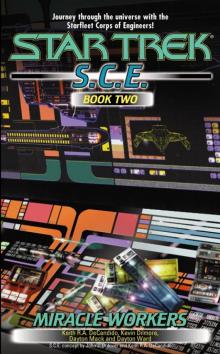 Miracle Workers
Miracle Workers Articles of the Federation
Articles of the Federation Supernatural Heart of the Dragon
Supernatural Heart of the Dragon War Stories: Book Two
War Stories: Book Two The Zoo Job
The Zoo Job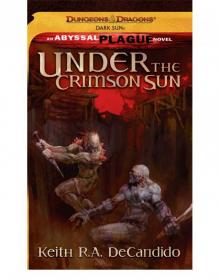 Under the Crimson Sun
Under the Crimson Sun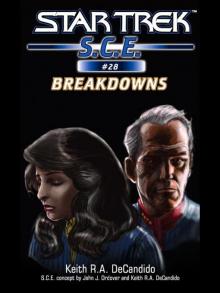 Breakdowns
Breakdowns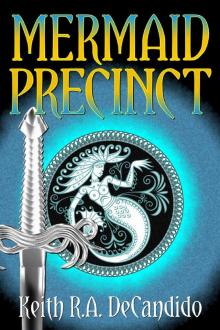 Mermaid Precinct (ARC)
Mermaid Precinct (ARC) Supernatural 1 - Nevermore
Supernatural 1 - Nevermore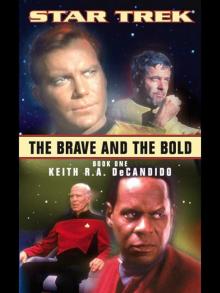 STAR TREK - The Brave and the Bold Book One
STAR TREK - The Brave and the Bold Book One Four Walls
Four Walls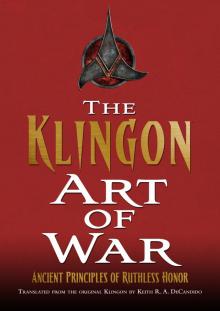 The Klingon Art of War
The Klingon Art of War Blackout
Blackout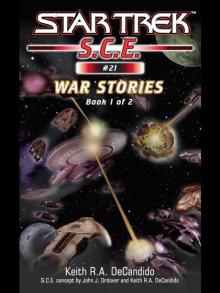 War Stories: Book One
War Stories: Book One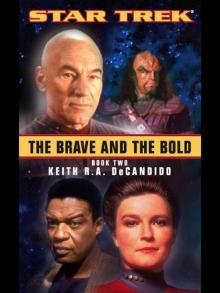 The Brave and the Bold Book Two
The Brave and the Bold Book Two Honor Bound
Honor Bound Sleepy Hollow: Children of the Revolution
Sleepy Hollow: Children of the Revolution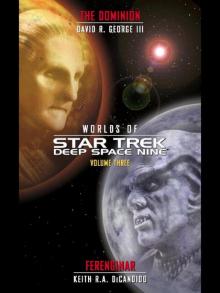 Worlds of Star Trek Deep Space Nine® Volume Three
Worlds of Star Trek Deep Space Nine® Volume Three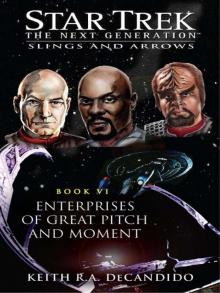 Star Trek: TNG: Enterprises of Great Pitch and Moment
Star Trek: TNG: Enterprises of Great Pitch and Moment Genesis
Genesis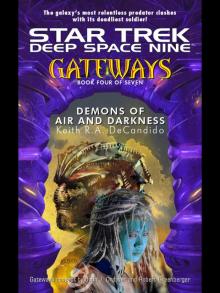 Demons of Air and Darkness
Demons of Air and Darkness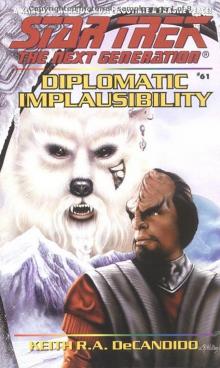 Star Trek - TNG - 61 - Diplomatic Implausibility
Star Trek - TNG - 61 - Diplomatic Implausibility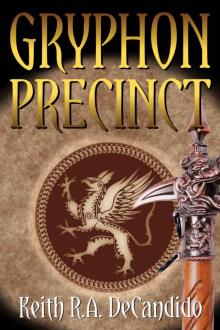 Gryphon Precinct (Dragon Precinct)
Gryphon Precinct (Dragon Precinct)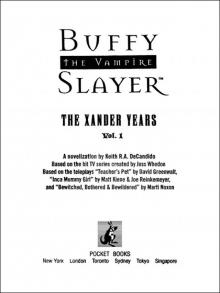 THE XANDER YEARS, Vol. 1
THE XANDER YEARS, Vol. 1 Nevermore
Nevermore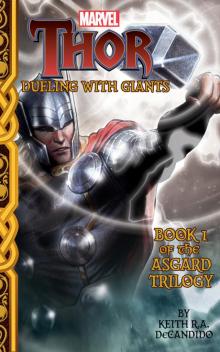 Thor
Thor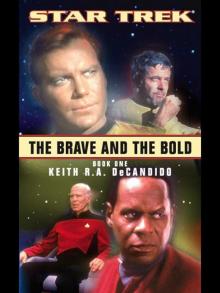 The Brave And The Bold Book One
The Brave And The Bold Book One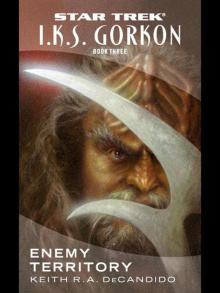 I.K.S. Gorkon Book Three
I.K.S. Gorkon Book Three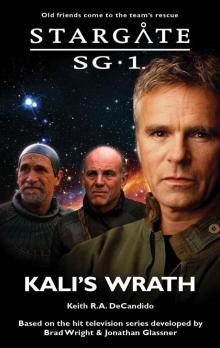 STARGATE SG-1: Kali's Wrath (SG1-28)
STARGATE SG-1: Kali's Wrath (SG1-28) Bone Key
Bone Key Guilt in Innocece
Guilt in Innocece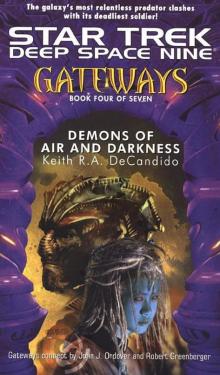 Star Trek - DS9 Relaunch 04 - Gateways - 4 of 7 - Demons Of Air And Darkness
Star Trek - DS9 Relaunch 04 - Gateways - 4 of 7 - Demons Of Air And Darkness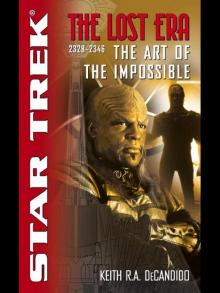 The Art of the Impossible
The Art of the Impossible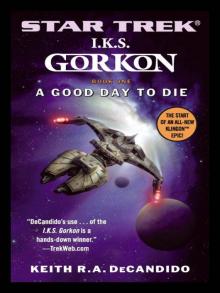 I.K.S. Gorkon Book One: A Good Day to Die
I.K.S. Gorkon Book One: A Good Day to Die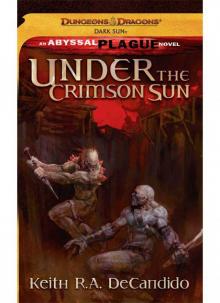 Under the Crimson Sun (the abyssal plague)
Under the Crimson Sun (the abyssal plague)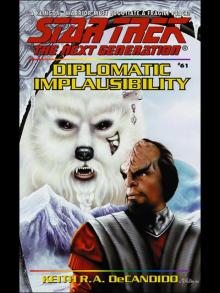 DIPLOMATIC IMPLAUSIBILITY
DIPLOMATIC IMPLAUSIBILITY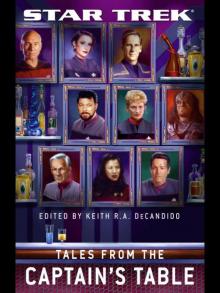 Tales from the Captain's Table
Tales from the Captain's Table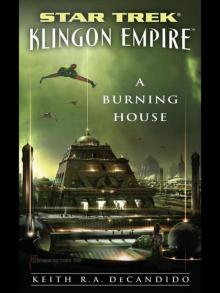 A Burning House
A Burning House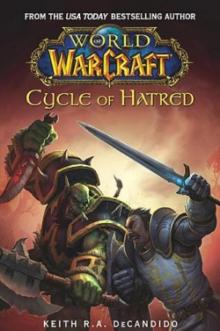 Cycle of Hatred (world of warcraft)
Cycle of Hatred (world of warcraft)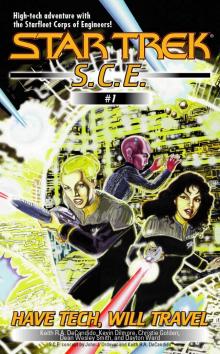 Have Tech, Will Travel
Have Tech, Will Travel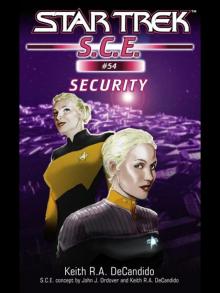 Security
Security